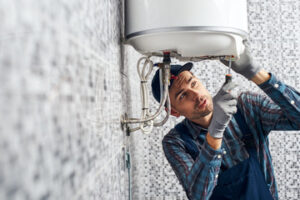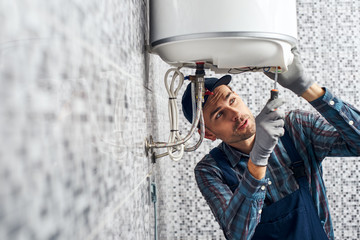Most homeowners take their water heaters for granted until they break down. Then, showers and laundry become unheard of, dishes go undone, and a whole household can feel like it has come to a halt.

Some water heater problems require the help of a professional. These issues can include a lack of hot water, leaking, faulty pilot lights, or strange noises. Contact Water Heater Repair Spring TX for professional help.
Water heaters play a very important role in the daily lives of many families. They are used to heat homes, wash clothes, cook meals, and provide a constant supply of hot water for showers. When they break down, it can be a major inconvenience and cause serious damage to home plumbing and piping. It’s important to catch problems early, like a leak or no hot water, so they can be repaired before too much damage is done.
An electric water heater that produces no hot water might have a tripped high temperature limit switch, a broken heating element, or both. Start by shutting off power to the heater at your home’s service panel. Disconnect the upper and lower heating elements and remove their covers. With the power still off, use a multi-meter to check the heating elements for continuity (they should read about 13 ohms of resistance). If both are broken, you will need to replace them. Our Replacing a Heating Element video gives step-by-step instructions.
A gas-powered water heater has a different type of thermostat that may require more troubleshooting and repair. If yours does not produce a pilot flame, you will need to use a long lighter to reach into the access cover and light it manually. After a minute, the pilot should glow steady, and you can turn the gas valve back on to activate it.
Another possible issue with a gas-powered heater is that the thermocouple has gone bad. A professional can replace it for you if needed. Finally, a noisy water heater that is producing popping or crackling sounds could indicate mineral deposits that need to be removed. This is usually an easy problem to fix and does not require a professional. Water that smells rotten or metallic could indicate that the hot water tank is leaking and needs to be replaced. If you notice a large area of water around the heater, it is time to call in a professional. Water leaks can ruin flooring and cause severe property damage. Leaks in the basement are particularly dangerous and should always be addressed immediately.
Element
Most people don’t think much about their water heater, as long as it works. When it breaks down, though, we suddenly realize just how important this household appliance is. Without a functioning water heater, no one can take hot showers, wash dishes, or do laundry. That’s why it’s critical to repair your water heater as soon as you notice an issue.
If you don’t have any hot water, first check to make sure the circuit breaker or high-temperature cutoff isn’t tripped. Pressing the reset button on these switches will restore power to your water heater and hopefully get it up and running again. If you do this and your heater still doesn’t produce hot water, the problem could be with the upper or lower heating element.
A bad heating element is a common problem with electric water heaters, as they can burn out and short circuit. If you notice that your heater is tripping the circuit breakers, it’s probably time to call a professional plumber to replace the heating elements.
In addition to being expensive, it’s also inconvenient to be without hot water for an extended period of time. Luckily, a professional plumber will be able to diagnose the problem and provide an efficient solution.
Occasionally, sediment can accumulate inside the bottom of your tank. Over time, this will create a buildup that may affect the performance of your heater. To avoid this, it’s recommended that you drain and flush your water heater at least once per year. If you aren’t comfortable doing this yourself, a local plumber can usually do it for an hourly rate.
Another part of your water heater that can wear out is the dip tube. This tube transfers cool water from the top of your tank to the bottom so it can be reheated by the heating element. If this tube goes bad, you’ll experience a loss of efficiency, as cold water will mix with the hot water and reduce its temperature.
It’s also possible that you have a problem with the thermocouple or gas control valve, both of which are fairly simple to fix. These small parts can go bad due to old age or excessive sediment. The thermocouple is a safety device that detects whether the pilot light is lit or not, and the gas control valve controls the flow of gas to the burner.
Dip Tube
The dip tube is responsible for dropping cold water down to the bottom of the tank to mix with the hot water before it exits to your faucets. If you notice that your showers start out hot but quickly turn lukewarm, or you run out of hot water in the middle of a shower, this is likely because the dip tube has broken and isn’t dumping cold water to the bottom of the tank.
The good news is that fixing this problem is relatively simple and involves replacing the dip tube with a new one. First, make sure that the power to the water heater is turned off at the circuit breaker for safety reasons. Then, drain several gallons of water from the tank using your garden hose or the hot water drain valve.
Once the water is drained, locate the dip tube on the top of the tank and disconnect it by loosening the inlet connection nipple with a pipe wrench. Next, remove the old dip tube and replace it with a new one. When selecting a replacement, opt for one made from heat-resistant plastic rather than metal to prevent damaging the sacrificial anode that is also installed in the tank. Metals react with the anode and can hasten its consumption, which can lead to rust-related tank leaks.
When installing the new dip tube, apply a small amount of plumber’s tape to the end of the plastic tube to seal off any potential leaks. Then, insert the new tube into the inlet and push it all the way down into the tank to ensure that it reaches the water at the bottom of the tank. Finally, screw the inlet nipple and connector back onto the tank, reconnect the cold water pipe, and restore power to the water heater.
If you follow these steps, your water heater should return to full functionality and you’ll be enjoying piping hot showers again before you know it! However, if your water heater continues to malfunction, it’s best to call in the professionals at Mr. Rooter to take a look at your unit and perform a thorough inspection.
Pressure Valve
The pressure valve is a vital safety feature of the water heater. It is designed to discharge excess hot water and reduce the risk of a catastrophic explosion of the tank. It works by using a mechanical spring to force open the metal valve lever, which discharges water into the discharge tube. The discharge tube is designed to extend about six inches above the floor of the water heater.
Whenever the pressure of a water heater rises, the pressure valve opens. Ideally, the water flows freely through the valve and is not restricted. But if the pressure is excessive, the valve will begin to crack. Eventually, the crack will increase in size until it is large enough to open the valve and relieve the pressure.
To prevent the risk of explosion, most states and cities require that the pressure relief valve be capable of releasing the excess heat and water in a controlled way. This is why most homeowners in Chicago test the pressure valve when they flush and drain their water heater twice a year.
When the pressure valve is functioning properly, water is discharged through the valve when the hot water temperature in the water heater reaches the set point. The water then flows through the discharge pipe and down the drain, thereby lowering the water pressure in the pipes and preventing the pressure from rising above the valve setting.
The most common cause of a malfunctioning water heater pressure valve is a faulty body or seal. The seal material must be compatible with the fluid to be pumped and must be able to function in the expected operating temperature range. Buna-N is a common seal material, although some manufacturers offer alternative materials.
Another possible reason for a faulty water heater pressure valve is a physical restriction in the water heater or plumbing system. If the water heater has not been installed correctly, or if the pipes connecting it to the water heater are too small or clogged with mineral deposits, pressure could build up. This may eventually cause the relief valve to crack open and leak water.



